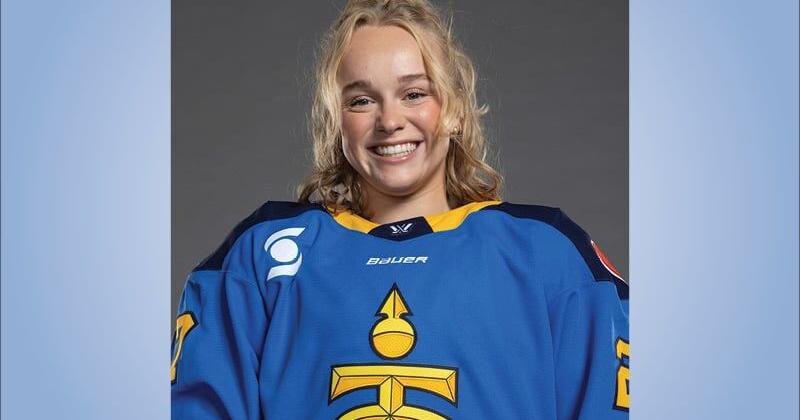When hockey player Emma Maltais — Toronto Sceptres team member, Olympic gold medal winner, three-time world champion — pauses to reflect on this moment in her life, “a little overwhelmed” is the phrase she uses.
“It’s day-to-day survival,” says Maltais. When we speak with her, she’s at home in Toronto, freshly returned from a Sceptres away game in Minnesota and already packing to join Team Canada in the Czech Republic at the Women’s World Championship. (They’d claim silver in a nail-biting 4-3 final against the U.S.)
Her packed schedule is a direct result of the enthusiasm that has greeted the PWHL [Professional Women’s Hockey League] since it launched in 2023, its packed arenas and cheering crowds reflecting the global groundswell for women’s professional sports. “It’s a lot, and it’s something that all of us aren’t used to,” says Maltais. “When you add the attention that the PWHL has gotten and the attention I’ve been lucky enough to have, sometimes there can be pressure with that, and responsibility.”
Here’s how she’s navigating it.
On being a breakout star of the PWHL:
Maltais is a forward known for her scrappy style and cheeky comebacks, and she’s emerged as one of the league’s fan favourites. “I would die for this woman,” wrote one Reddit commenter underneath a video of Maltais’ off-the-cuff comments while mic’d up during a game. “I love Emma’s energy,” says another.
On TikTok, Maltais documents her life as a professional athlete — locker room pranks, bus rides to games, days off in the cities the teams travel to. One of her viral videos, which has 1.2 million views, features her Sceptres teammates pulling disgusted faces in reaction to a comment about how women playing professional hockey can’t be taken seriously.
Maltais happens to be five foot two, a beacon to short people who’ve felt their height was an obstacle to athletic success. “I don’t want to say that it’s adversity, but it’s something that a lot of women deal with,” she says with a laugh. “It’s important to see that it’s still possible if you’re short — and it’s possible to be one of the stronger, tougher players.”
On the sport/fashion connection:
The growing opportunities for athlete fashion collabs — like a recent Barbie x PWHL fashion collection — are pure joy for Maltais, who loves a “really high heel,” the butter yellow trend and a hair bow; her most recent purchase is a pink Coach Tabby bag.
“When I was growing up and playing hockey with the boys, I was put into a shirt and tie and I would have to wear the same boys’ peacoat,” she says. “I remember a couple years later, running into one of the boys’ parents and they were like, ‘Oh Emma, you look girlie,’ and I was like, ‘Yeah, because I am a girl.’”
To her, the PWHL letting players express “their own unique style” feels like progress. “I love the feeling when someone looks at me and says, ‘Oh I like your outfit, it’s different,’” she says. “I also love feeling powerful in a great outfit.”
On the importance of a good sports bra:
“A bra is just another piece of clothing,” says Maltais, who recently starred in a campaign for Bravado Designs, now the PWHL official bra partner. “It’s a miss that we don’t talk about it.” The sooner we can dissolve the stigma around bra-wearing, and other women’s issues, the better, she adds.
So what is a pro athlete looking for in a sports bra? “Support, so I don’t feel like I’m all over the place,” she says. “I also look for comfort, softness, and a bra that’s not digging in. Also, is it pretty? That’s important.”
Her own bra wardrobe has benefited from this partnership. “I’ve had sports bras in my closet that are as old as when I started wearing bras,” she says. “[Working with Bravado] was the first time in 15 years that I actually got my breasts sized and felt good in a bra that wasn’t a janky old sports bra where the seams were coming out.”
On the weight of making history:
Maltais recognizes that she’s part of this trail-blazing vanguard because her own career is blooming at the exact right time. “There are so many women before me who wish they had gotten the opportunity to play in the PWHL,” says Maltais. Many of her high school friends who played sports have told her they wish they’d known women’s pro sports would grow this much, because they wouldn’t have dropped out. “When I zoom out and think about the position I’m in, I’m eternally grateful,” she says.
But being around powerhouses like her teammate Sarah Nurse has taught her to keep expanding her ambition. “As women, we tend to be very grateful for our opportunities, but it doesn’t mean we should put limits on things.”
She measures success on two levels: The scoreboard on game day, and her impact on the community, like when a young girl asks her for a photo and tells her that she’s playing hockey now. “Those are times where you really realize the impact you can have.”



